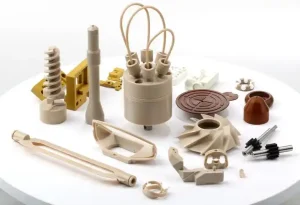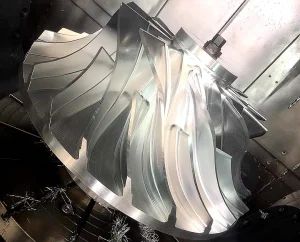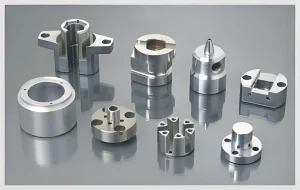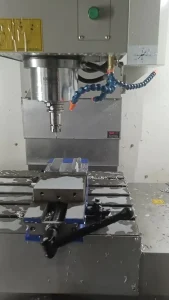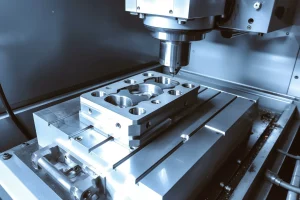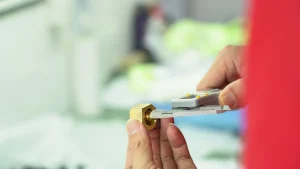介绍
在现代制造业中, precision parts processing serves as the cornerstone, 支撑各种行业的发展. Whether it’s the aerospace sector, where the slightest error in a component can jeopardize flight safety, or the Electronic communication field, demanding impeccable precision for seamless signal transmission, the significance of precision parts cannot be overstated. The quality and reliability of these parts directly dictate the performance and lifespan of end products. 然而, with a plethora of precision parts processing plants vying for attention, discerning the truly reliable ones can be a daunting task. This article will elucidate four fundamental methods to help you make an informed choice, while also highlighting the value that Rapidefficient brings to the table in the CNC machining market.
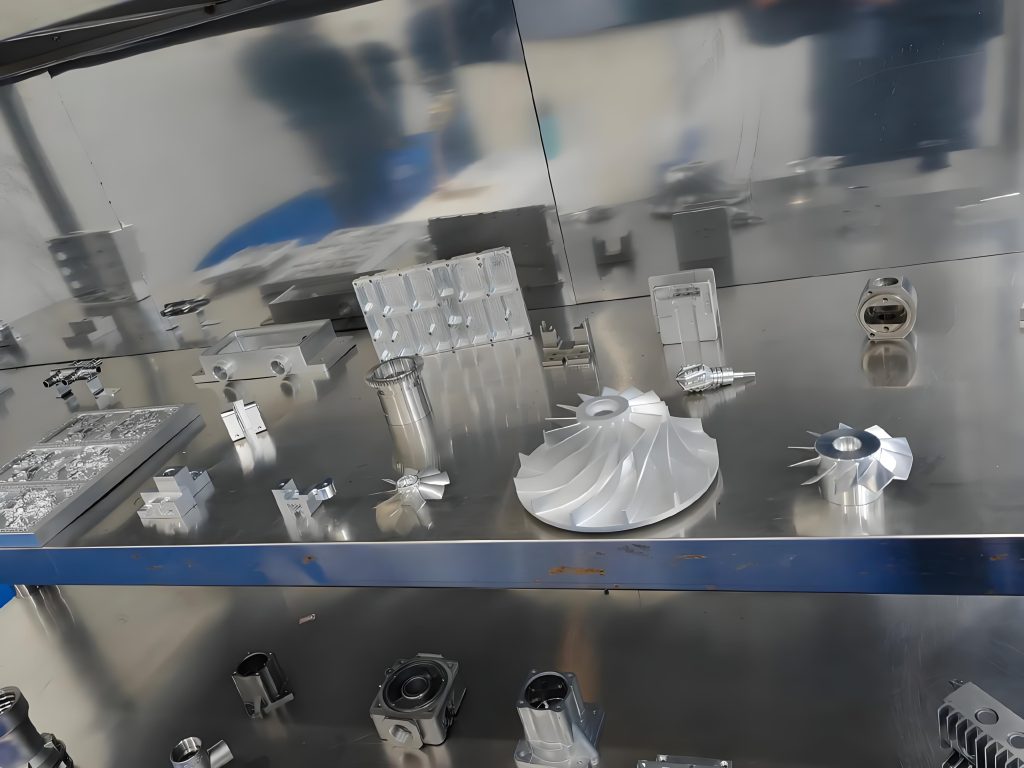
方法 1: Evaluate Equipment and Technology
The foundation of reliable precision parts processing lies in advanced equipment and sophisticated technology. State-of-the-art machinery not only determines the precision and quality of the finished products but also significantly impacts production efficiency. When assessing a processing plant, a comprehensive examination of its equipment arsenal is essential.
Start with the CNC machining centers, which serve as the workhorses of precision manufacturing. High-quality machining centers, equipped with advanced servo control systems and high-resolution grating scales, can achieve positioning accuracies down to the nanometer level. This level of precision ensures that every cut, 钻头, and mill is executed with utmost accuracy, conforming to the most stringent design requirements. 例如, 在航空航天组件的生产中, where tolerances are measured in microns, such precise machining is non-negotiable.
Precision measurement instruments also play a pivotal role. Coordinate measuring machines (三坐标测量机), optical profilometers, and laser interferometers are indispensable tools for quality control. They enable real-time monitoring of the machining process, detecting even the slightest deviations and facilitating immediate corrections. This continuous feedback loop guarantees that parts meet the exact specifications, minimizing rejects and rework.
Beyond the existing equipment, a plant’s commitment to technological innovation is a telling sign of its reliability. 在当今快速发展的制造格局中, staying abreast of the latest advancements is crucial. Consider Rapidefficient, which has consistently invested in research and development. Their adoption of artificial intelligence-driven machining optimization software has revolutionized their production process. By analyzing vast amounts of data in real-time, the software can adjust machining parameters on the fly, enhancing both precision and efficiency. This forward-thinking approach not only sets them apart but also ensures that their clients receive top-notch quality parts, even as industry standards evolve.
方法 2: Examine Quality Control Systems
A robust quality control system is the linchpin of any reliable precision parts processing plant. It serves as the safeguard, ensuring that every component that rolls off the production line adheres to the most exacting standards. Without stringent quality control, even the most advanced equipment and skilled workforce can produce inconsistent results, leading to costly rejections and potential failures in the end products.
At the onset of the production process, raw material inspection plays a crucial role. High-quality precision parts demand raw materials of equally superior quality. Reputable plants will subject incoming materials to a battery of tests, including spectroscopic analysis to verify chemical composition, hardness testing to assess mechanical properties, and dimensional inspection to ensure conformity to specifications. This meticulous scrutiny at the source helps weed out subpar materials that could compromise the integrity of the final product.
During the actual processing, in-process quality control is essential. This involves continuous monitoring of machining parameters such as cutting speeds, feeds, and tool wear. Automated inspection systems, equipped with advanced sensors and cameras, can detect minute deviations from the programmed paths and alert operators in real-time. 例如, in the production of microelectronics components, where tolerances are measured in nanometers, any deviation can render the part useless. In-process control allows for immediate corrective actions, minimizing scrap and ensuring consistent quality.
The final inspection stage is the last bastion of quality assurance. 这里, a comprehensive suite of metrology tools comes into play. CMMs are used to measure complex geometries with high precision, while surface finish analyzers assess the smoothness and texture of the parts. Optical inspection systems can detect even the tiniest surface defects, such as scratches or pits, that could impact the part’s functionality. Only parts that pass this rigorous final inspection are deemed fit for delivery.
Rapidefficient has established a reputation for its unwavering commitment to quality control. Their quality management system is based on international standards, with dedicated quality control teams stationed at every stage of the production process. From the initial inspection of raw aluminum billets to the final inspection of machined components, every step is meticulously documented and traceable. This not only ensures that customers receive parts of the highest quality but also provides them with the confidence and peace of mind that comes with partnering with a reliable supplier.
方法 3: Assess Production Capacity and Efficiency
Beyond the realm of equipment and technology lies the critical factor of production capacity and efficiency. A reliable precision parts processing plant must not only possess the means to produce high-quality components but also do so in a timely and cost-effective manner.
The quantity and quality of production equipment serve as the starting point for evaluation. A plant equipped with a large fleet of advanced CNC machines, such as multi-axis machining centers and high-speed milling machines, inherently has the potential for higher production volumes. 例如, a facility with dozens of state-of-the-art machining centers can handle complex orders that require simultaneous production of multiple part variants. This not only shortens lead times but also allows for greater flexibility in meeting fluctuating market demands.
The skill level and experience of the workforce are equally crucial. Skilled machinists, who have spent years honing their craft, can operate the equipment with finesse, maximizing productivity while minimizing errors. They possess an in-depth understanding of machining processes, enabling them to make real-time adjustments to optimize production. 相比之下, a novice workforce may struggle with complex operations, leading to longer setup times, increased scrap rates, 最终, delayed deliveries.
Efficient production scheduling and management systems are the glue that binds everything together. Advanced software solutions, capable of optimizing production sequences, allocating resources, and tracking progress in real-time, are essential. This ensures that orders are processed in the most efficient order, minimizing idle time for both machines and workers. 例如, a just-in-time (JIT) production system can reduce inventory holding costs while ensuring that parts are delivered precisely when needed.
Delivery times and order fulfillment rates are tangible metrics that reflect a plant’s efficiency. A reliable processor will have a track record of meeting or even exceeding promised delivery dates. This not only instills confidence in customers but also minimizes disruptions to their production schedules. Late deliveries can have a cascading effect, causing downstream production delays and potentially incurring significant financial penalties.
When comparing small and medium-sized processing plants to larger counterparts, there are distinct differences. Smaller plants often offer greater flexibility and personalized service. They can quickly pivot to accommodate last-minute design changes or urgent orders. 然而, they may struggle with large-volume orders due to limited equipment and manpower. Larger plants, 另一方面, boast greater economies of scale, enabling them to handle massive production runs with ease. 然而, they may face challenges in providing the same level of individualized attention.
Rapidefficient strikes a balance between these extremes. With a well-equipped facility and a team of highly skilled professionals, they have the capacity to handle orders of varying sizes. Their advanced production management system ensures that each order is processed with the utmost efficiency, from initial design review to final delivery. This agility and efficiency have made them a preferred choice for clients seeking both quality and timely service.
方法 4: Consider Reputation and Customer Service
The reputation of a precision parts processing plant and the quality of its customer service are often overlooked yet crucial aspects in the selection process. A plant’s reputation is a culmination of years of consistent performance, ethical business practices, and client satisfaction.
To gauge a company’s reputation, start by exploring customer reviews and testimonials. In today’s digital age, online platforms and industry forums are replete with insights from actual clients. Look for patterns in the feedback – recurring praises for on-time delivery, 卓越的质量, and responsive service indicate a reliable partner. 反过来, consistent complaints about missed deadlines, subpar quality, or unresponsiveness should raise red flags.
Industry word-of-mouth also plays a significant role. Reach out to colleagues, business associates, or industry experts who have firsthand experience with different processors. Their recommendations and cautions can provide invaluable guidance, steering you away from potential pitfalls.
A plant’s tenure in the market is another telling factor. Those with a long-established presence have likely weathered industry challenges, refined their processes, and built a reliable network of suppliers and subcontractors. This stability translates into a lower risk for clients, ensuring continuity of supply and consistent quality.
Equally important is the quality of customer service. A reliable processor understands that clear communication is the bedrock of a successful partnership. From the initial inquiry to post-delivery support, prompt and transparent communication is essential. When you reach out with a question or a request, observe how quickly they respond. Do they provide detailed and accurate information, or do you find yourself chasing for answers?
Problem-solving capabilities are another hallmark of excellent customer service. In the complex world of precision parts manufacturing, issues are bound to arise – be it a design change mid-production, a quality hiccup, or a shipping delay. A reputable plant will have a dedicated team that jumps into action at the first sign of trouble, working tirelessly to find a satisfactory resolution. This could mean expediting a replacement part, providing detailed root cause analysis, or offering compensation for any inconvenience caused.
Rapidefficient has carved a niche for itself with its stellar reputation and customer-centric approach. Their client testimonials are a testament to their commitment, with customers lauding their ability to not only meet but exceed expectations. Whether it’s accommodating tight deadlines, providing design for manufacturability (直接制造) advice to optimize costs, or offering after-sales support, Rapidefficient has consistently delivered. This dedication to service has not only earned them repeat business but also a growing list of referrals, solidifying their position as a go-to precision parts processing plant.
结论
Identifying a reliable precision parts processing plant is no small feat, but by meticulously evaluating equipment and technology, scrutinizing quality control systems, assessing production capacity and efficiency, and considering reputation and customer service, you can make a well-informed choice. 记住, each of these aspects is interconnected, and a weakness in one area could potentially undermine the overall reliability of the supplier.
Rapidefficient stands as a prime example in the CNC aluminum processing domain, exemplifying excellence in all these facets. Their state-of-the-art equipment, unwavering commitment to quality, impressive production capabilities, and stellar reputation make them a go-to option for those seeking precision and reliability. 然而, it’s always prudent to conduct your due diligence and compare multiple options before finalizing a partnership. With the right processor by your side, you can rest assured that your precision parts will meet the highest standards, propelling your products and business to new heights.

